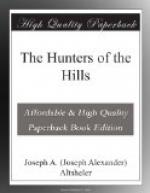“I speak to you not as a Frenchman nor as an Englishman,” said Tayoga, “but as a warrior of the clan of the Bear of the nation Onondaga, of the great League of the Hodenosaunee. Most of this land belonged to our fathers before ever Englishmen or Frenchmen crossed the great water and put foot upon these shores. Where you sit now was Stadacona, the village of our brother race, the Mohawks. Frenchmen or Englishmen may make war upon one another, or they may make peace with one another, but the Hodenosaunee cannot be forgotten. There are many beautiful rivers and lakes and forests to the south and west, but they do not belong to either Onontio or Corlear. The laws of the fifty sachems who sit in council in the vale of Onondaga run there, and those who leave them out, be they French or English, reckon ill. There was a time when Frontenac came raiding their villages, burning and slaying, but we did not know the use of firearms then. Now we do know their use and have them, and in battle we can meet the white man on equal terms, be he English or French. I have been to the white man’s school and I have learned that there are other great continents beyond the sea. I do not know what may happen in them, nor does it matter, but in this vast continent which you call America the wars and treaties of the English and the French are alike unavailing, unless they consider the wishes of the Hodenosaunee.”
He spoke in a manner inexpressibly haughty, and when he had finished he swept the table from end to end with his challenging glance, then he sat down amid a deep silence. But they were French. They understood that he had tossed a glove among them, their quick minds saw that the challenge was intended not alone for them, but for the English as well, unless the rights of the Hodenosaunee were respected, and such a speech at such a time appealed to their gallant instincts. After a moment or two of silence the applause burst forth in a storm.
“’Twas a fair warning,” said de Courcelles in Robert’s ear, “and ’twas meant for us both.”
It was on Robert’s tongue to reply that the English were included for the sake of courtesy, as they were the friends of the Hodenosaunee and always kept faith with them, but second thought stopped the words on his lips. Then the band began again, playing a warm song of the south from the Florentine opera, and the talk increased. It seemed to Robert that everybody spoke at once, and his senses were again steeped in the music and the perfumed air, and the sound of so many voices. Presently he realized that some one across the table was speaking to him.
“The Onondaga said bold words in behalf of his league, but can he prove them true?” the voice was saying.
There was something provocative in his tone, and Robert looked closely at the speaker. He saw a tall man of at least forty-five, thin but obviously very powerful and agile. Robert noticed that his wrists were thick like his own and that his fingers were long and flexible. His face was freckled, his nose large and curved, giving to his face an uncommonly fierce appearance, and his eyes were black and set close together. It was a strong countenance and, when Robert looked at him, the black brows were drawn together in a frown. His words undoubtedly had a challenge in them, and the youth replied:




